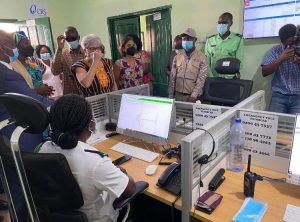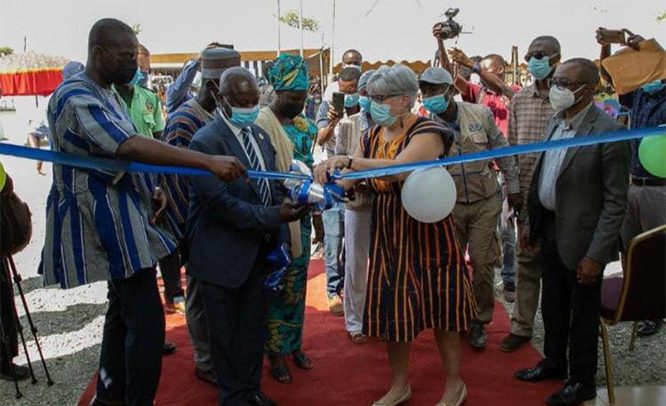Ambassador Stephanie S. Sullivan commissioning the District Emergency Dispatch Center in Gushegu
The United States Ambassador to Ghana Ambassador Stephanie S. Sullivan has commissioned Ghana’s first-ever decentralized District Emergency Dispatch Center(EDC) in Gushegu in the Northern region.
The Emergency Dispatch Center is a key component of a $ 5.1 million U.S-supported health system strengthening project Developing Acute Care and Emergency Referral Systems (ACERS) Project which raises awareness amongst community members to seek emergency services and support health workers to improve service delivery.
The project focuses on mothers and newborns addressing bottlenecks in accessing safe and quality healthcare services at critical times.
Addressing participants at the ceremony, the US Ambassador said Ghana has come a long way in improving health services for pregnant women, breastfeeding mothers, and their newborns.
“ According to the 2017 maternal health survey, more than 300 mothers die out of every 100,000 births in Ghana every year and 25 babies die out of every 1,000 births and many of these deaths can be prevented.”
She indicated that in 2019, the government of Ghana and the United States government launched the Developing Acute Care and Emergency Referral Systems (ACERS)project together with the Ghana Health Service, Ghana National Ambulance Services, District assemblies, and communities to implement new approaches to improve emergency referrals and save lives.
“Previously in Gushegu, if a pregnant woman required emergency care she was carried on a bicycle or a motorbike or even physically carried by her fellow community members to a health center. In 2018 only one out of three pregnant women went to a health facility to deliver and even those mothers do not always receive the best of care. Institutional maternal mortality was high about 160 per 100,000 births.”
Ambassador Sullivan disclosed that over the past three years, working with committed community members, health facilities, officials from the government of Ghana together have improved awareness of maternal danger signs and complications among pregnant women and mothers through the strengthening of pregnancy schools.
“Pregnancy schools are where pregnant women and their partners receive education on prenatal care, delivery, and postnatal care. Our efforts have paid off, 58% of pregnant women can now recognize the three most common pregnancies danger signs which are bleeding, headaches and swallowing of the feet.”

According to her, the Gushegu District Emergency Dispatch Center now brings services closer to the doorstep of the people making emergency care faster and more efficient.
“Calls are now taken at the local level where local staffers have the needed information and local contacts at hand and can respond more efficiently. This dispatch center operates 24/7 hours a day 7 days a week tracking the availability, movement, and activities of the ambulances in real-time.”
She assured me that the US government is committed to supporting Ghana to deliver high-quality care for pregnant women and their babies and to end preventable maternal newborns and child deaths.
Mr. Daniel Mumuni, Country Director, Catholic Relief Services (CRS), said they have established 84 pregnancy schools with the session facilitated by community volunteers working with community health workers which have tremendously enhanced maternal newborn health literacy.
He noted that for referral and dispatch coordination, the Developing Acute Care and Emergency Referral Systems (ACERS)project has provided modern and standardized 7 tricycle ambulances to support 14 other tricycle ambulances previously provided by CRS and its partners across the five regions of the North.
“We have already coordinated referral transport of 2,744 emergency cases adverting any negative outcome including deaths.”
Mr. Mumuni revealed that CRS has supported the capacity building of 185 health staff and 542 community-based agents to support the delivery of maternal and newborn services.
He thanked the government, the Gushegu MP, the Coordinator for the Special Initiatives, and the United States government for their immense support to bring quality health care to the doorsteps of the people of Gushegu and its environs.
The Chief Executive of the National Ambulance Service, Professor Ahmed Nuhu Zakaria, said they started that ambulance service with 7 stations adding that now they can boast of 297 stations with over 3,000 emergency service technicians across the country.
He said the Emergency Dispatch Center has come at the right time saying “ it would have taken us several years to be able to get to a point where we will have a rural emergency response system but thank you to USAID, CRS, National Ambulance Service, Special Development Initiatives and the local Government today the first of its kind in the country is being launched in Gushegu in the Northern region.”
“This collaboration has been a success and we hope that we will be able to replicate it in other regions,” he said.
FROM Eric Kombat, Gushegu


